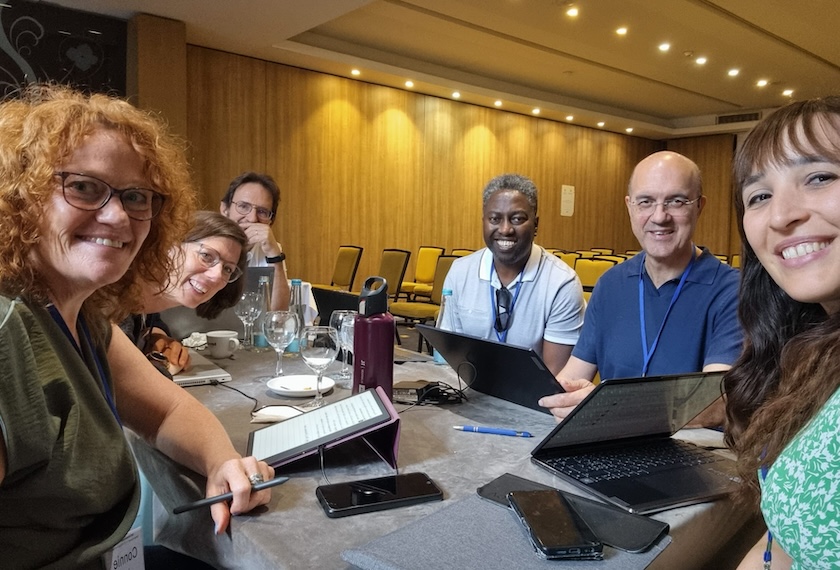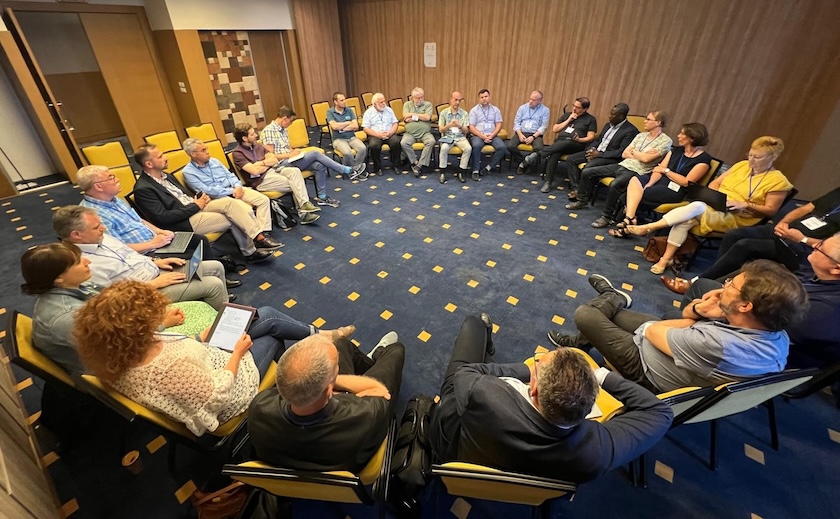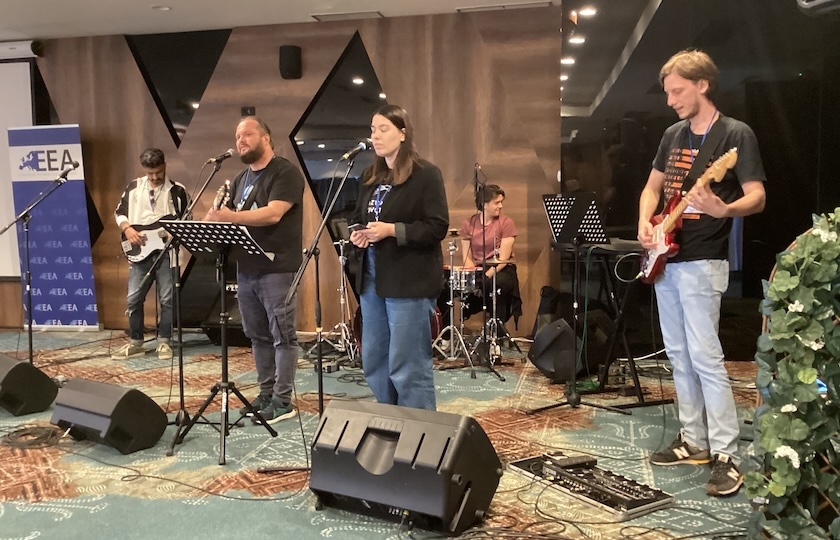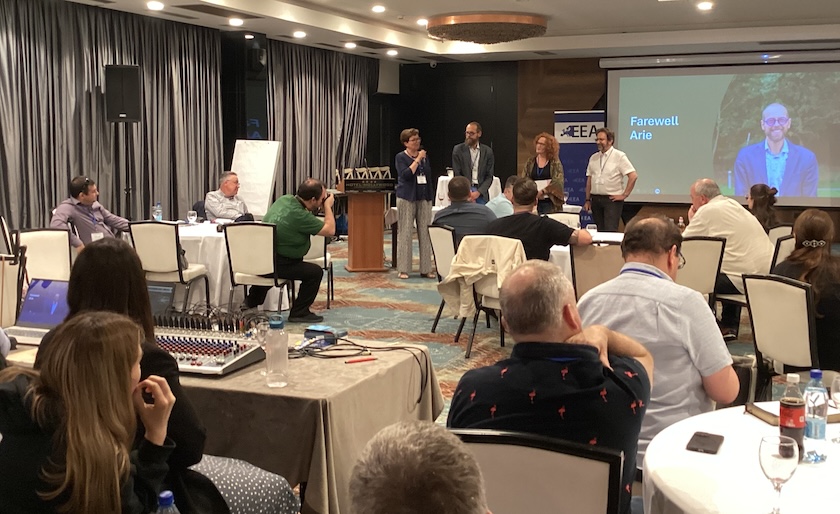Personal relationships were initiated or deepened, and synergy initiatives opened up. The call to build an intercultural and intergenerational church struck a chord.
![One of the sessions of the 2024 General Assembly of the European Evangelical Alliance in Sarajevo, 11-14 June. / Photo: [link]Vlady Raichinov, EEA[/link].](https://cms.evangelicalfocus.com/upload/imagenes/667a68ccd475c_GA24_914Cropped.jpg) One of the sessions of the 2024 General Assembly of the European Evangelical Alliance in Sarajevo, 11-14 June. / Photo: [link]Vlady Raichinov, EEA[/link].
One of the sessions of the 2024 General Assembly of the European Evangelical Alliance in Sarajevo, 11-14 June. / Photo: [link]Vlady Raichinov, EEA[/link].
From 11 to 14 June, the General Assembly of the European Evangelical Alliance was held in Sarajevo under the theme “Deeply rooted”, with the attendance of many of the general secretaries of the European Alliances and representatives of the “affiliates” organisations (linked entities with a presence in several countries of Europe).
The day before, the secretaries general of the 6 largest Evangelical Alliances in Europe, the United Kingdom, Germany, Switzerland, the Netherlands, France and Spain, held their usual meeting. On this occasion, the representatives of Germany and France were unable to attend.

[photo_footer] Gathering of the leaders of the 6 largest Evangelical Alliances in Europe. [/photo_footer] Throughout the 4 days of the meeting, the working scheme was very dynamic and interactive, with relatively short presentations interspersed with times of dialogue in small groups to reflect on the proposals and questions of the speakers. In these groups we also had times of prayer. The organising team did a great job.
On Thursday we had the General Assembly, in which we had the joy of reincorporating the Evangelical Alliance of Poland and approving the entry as affiliates of the following entities: Parliament and Faith, Revive, Wycliffe, País Movement and GO Movement. The General Assembly was certainly more dynamic and participative than usual; as Spanish Evangelical Alliance we put forward a constructive proposal for internal functioning.
The Authorisation Committee of the European Evangelical Alliance was renewed and renamed the Advisory Committee, and Marcel Valentin joined the Board of Directors.
We also had a meeting of Secretaries General and a meeting of Affiliates.

[photo_footer] Meeting of general secretaries of the national Evangelical Alliances. [/photo_footer]
Personal relationships were initiated or deepened, and synergy initiatives opened up. Thus the writer of this report had the privilege of connecting the European presidents of the European Nehemiah Center and Parliament and Faith, Jørn Brauner and Henry Svennson, who agreed to initiate steps to coordinate and support each other.
The biblical presentations revolved around the above-mentioned motto. Viviane Krucker-Baud spoke of “Deeply rooted as a way of life (Psalm 1)”, Tomislav Dobutovic of “Deeply rooted in the house of the Lord (Psalm 92)” and Bodill Skjott of “Deeply rooted in the Church and in the Lord”. The unity of message and challenge in the presentations was striking.

[photo_footer] The Bosnian band that led the worship times. [/photo_footer]
The call to build an intercultural and intergenerational church struck a chord as well. In addition to Usha Reifsnider, co-director for Europe of the Lausanne Movement, several speakers touched on the theme. It is not about placing one generation behind another, nor one cultural group next to another, it is not exactly about building multiculturalism, but about making the different generations and cultural groups participate in the life, the lines of work and the responsibilities of the church in a single body that builds with unity, identifying diversity in a natural way.
In this sense, we agree in recognising the role of immigrants in our churches in Europe as a new flow of renewal in number and quality. We do not forget that, since the Antioch episode (Acts 11), the Church spread throughout Europe from a group of exiled migrants.
In the same perspective, young people must have their share of responsibility, not in a subsidiary but in a fully active way. Young people, as Martine Versteeg, Secretary General of the Alliance of the Netherlands, said, are not only the church of the future: they are part of the church of the present. We remind them that it is necessary to train our young people in apologetics, but above all to encourage them to actively live their faith in Jesus. In the Assembly itself we wanted to be consistent with this and we had young people who had presentations and active participation. By the way, the music was provided by a very good Bosnian group, which led us to sing some songs in Bosnian.
Hannelore Illgen and Elke Werner shared with us a report on the “Women in Leadership” programme.
The president of the EEA, Frank Hinkelman, led us to consider the general situation in Europe and, from the initial question “what does it mean to be evangelical in Europe today”, led us to the call to be transformed by the Spirit in order to transform Europe.

[photo_footer] Farewell of Arie de Pater. [/photo_footer]
The European Evangelical Alliance general secretaries, Connie Duarte and Jan Wessels, gave a summing up that challenged us all.
An emotional moment was when we said goodbye to Emily Lange, who has worked with excellence in the EEA office in Bonn (Germany), and to Arie de Pater, our man in Brussels, who has interacted with dedication and brilliant vision and effectiveness with the European institutions - we have to pray to find someone to continue this strategic work. We had another heartfelt moment when we shared in the celebration of the Lord’s Supper on Thursday evening.
We revisited the meaning of being salt of the earth and light of the world.
X. Manuel Suárez, secretary general of the Spanish Evangelical Alliance, writes this personal report summarising the 2024 General Assembly of the European Evangelical Alliance.

Las opiniones vertidas por nuestros colaboradores se realizan a nivel personal, pudiendo coincidir o no con la postura de la dirección de Protestante Digital.
Si quieres comentar o